Scheduling software: The ultimate guide for academic advisors
Add appointment scheduling software to your toolkit to make your advising more effective and create an outstanding student experience.

Kate Reynier

- Part 1 How do academic advisors help students?
- Part 2 How do students know who their academic advisor is?
- Part 3 How should students meet with an academic advisor?
- Part 4 What is the best way to schedule appointments online?
- Part 5 Scheduling software for higher education: Better for students, better for advisors
- Part 6 Make it easy for students to book time with you
- Part 7 Be prepared for every student meeting
- Part 8 Takeaway: student success depends on successful scheduling
Academic advisors are the unsung heroes of every college campus.
More than almost any other member of staff, they are working at the frontlines, responding to the ever-changing requirements, expectations, and challenges of today’s university students.
In the past decade, studies have shown that strong academic advising is a crucial element of student success and retention.
But for many students and parents, there is a lot of confusion about what academic advisors do, why they are important, and how students can access them. So let’s start with the basics.
How do academic advisors help students?
Academic advisors are professionally trained staff members that help students by making sure they are adjusting to university life.
They help students understand university policies and procedures and student services. They provide academic guidance, career exploration, and they help students make the most of their university experience.
Researchers have consistently shown that academic advisors play a pivotal role in ensuring students:
- persist through to graduation
- have meaningful interactions and experiences
- are able to navigate the complexities of university life, including understanding degree requirements, course registration, and academic support services
While record numbers of students are attending university, the pandemic has created a retention crisis. Large cohorts of students who started at a college or university aren’t returning for a second year. That could be down to a disruption in learning, mental health concerns, or financial pressures that are all a direct result of COVID-19.
And this isn’t only an issue for 2022. Experts predict students coming out of high school over the next several years will need “an unprecedented level” of support as they deal with the disruption to their academic and social development during the pandemic.
A well-planned, personalized academic advising program can help universities stem the flow by engaging with students early and often to ensure they are able to access the resources they need to be successful in higher education.
How do students know who their academic advisor is?
Even the best academic advising programs won’t succeed if students don’t engage with them.
Type “Who is my academic advisor” in Google and you’ll see students around the country are asking that very question.
You may have told them, written to them, and emailed them.
But first-year students are being bombarded with new information, experiences, and freedoms so “tell them, remind them, and tell them again” needs to be your mantra.
Not all students understand why they need to see their academic advisor. In fact, studies show that half of community college students don’t know academic advising is available to them.
Others think the system is too complicated, particularly if they’ve relied on parents to organize things for them in the past.
Most universities will list academic advisors on the department website. Some post it in classrooms and residence halls.
Choose what works best for your students but make sure you publicize advising in a way that is immediately actionable.
- If it’s on a website, include a link to a scheduling software page so the student can book time with you when they’re thinking of it.
- If it’s posted on a wall, add the QR code for your booking page to help students get the information they need when they need it.
Other institutions practice proactive advising which means students have a set schedule of mandatory advising sessions they need to attend before they can move on to the next phase.
With this option, the advisor can automate reminders for the student to make appointments and ensure they are meeting regularly.
That means sessions aren’t left to chance and it’s easier to catch issues early on.
How should students meet with an academic advisor?
If the pandemic taught us anything, it’s that meetings don’t have to be in-person to be productive. As digital natives, and after intensive periods of online learning, this generation of university students is used to communicating online.
Some advisors find students who are more anxious about meetings can prefer online sessions.
But not everyone does.
If you’re using scheduling software for higher education, you can offer a choice of options about how to meet so you’re working with students in a way that is most comfortable for them.
What is the best way to schedule appointments online?
Today’s university students are tech-savvy and mobile-first. They are used to finding and accessing resources online at any time of the day or night. And they have high standards for what that experience is like.
Using appointment scheduling software designed for higher education takes the hard work out of getting that experience just right with:
- mobile-friendly booking pages
- automated reminders
- friction-free cancel and reschedule options
- personalization for different year groups, departments, and types of sessions
Scheduling software delivers huge benefits for advisors as well.
It streamlines your booking process and eliminates the back and forth, no matter what your scheduling challenges.
It can free up hours a week, saving you time that is better spent focusing on your students.
Scheduling software for higher education: Better for students, better for advisors
Scheduling software for higher education is a simple way to dramatically improve the scheduling experience for you and for your students.
For students, you’re offering a fully customized, friction-free booking experience. They can find a time to meet with you at the moment they are thinking about it. No waiting around for your office to be open, and they can book on their phone or laptop.
Making it easier to book means more bookings for you.
For you, scheduling software ensures a consistent, professional system of taking bookings, automating tasks, and tracking data.
Less back and forth means more time for your students.
YouCanBook.me offers easy, accessible, and secure scheduling software that works brilliantly for academic advisors. We’ve developed the features you need to meet every scheduling challenge.
In this article, we will look at best practices for:
- Ensuring it's easy for students to book with you
- Managing appointments in your calendar
- Make sure you’re fully prepared for student meetings
- Reducing no-shows
Make it easy for students to book time with you
University students don’t shy away from technology for working, socializing, or shopping. But they expect the experience to be intuitive, seamless, and easy.
Using online scheduling software designed for higher education delivers just that for academic advising appointments.
Customizable booking pages
YouCanBook.me’s booking pages work great on mobile devices and are accessible (WGAG 2.0 Level AA compliant). So you’ll be pleased to hear you can create as many pages as you need, with each one tailored to a specific requirement.
You might have a separate booking page for each academic advisor, individual student groups, or different kinds of appointments.
This lets you ask page-specific questions on the intake form and automate custom emails for each booking.
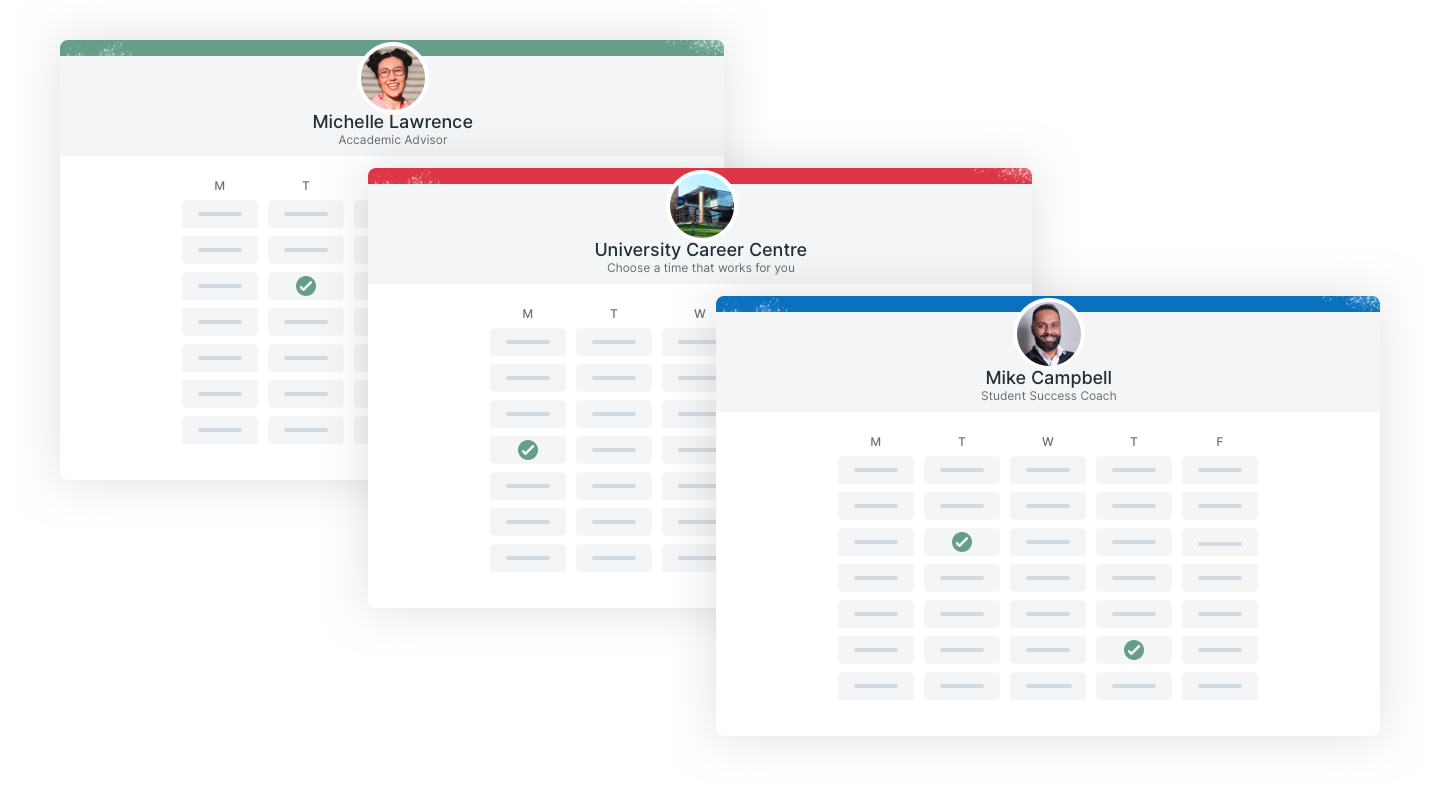
|
💡 Pro tip: Create booking page templates so you can quickly reproduce new pages on the fly! |
Automated video calls
Offer a choice of online or in-person appointments.
When students select a video meeting, YouCanBook.me will automatically generate a unique video link in either Zoom, MS Teams, or Google Meet.
This can be added to your emails and the calendar event that you and the student receives.
Your own branding
Add your school colors, an image of the mascot, your department logo, or a headshot to make it super clear that bookers are in the right place.
Friction-free appointment management
Reduce no-shows with one-click cancel and reschedule options.
No need for students to get in touch to let you know something has come up.
If they make a change, your calendar automatically updates and you can trigger automatic emails to communicate clearly about the next steps.
“YouCanBook.me really facilitated the equity for our students.” - Danny Ryel, Portland State University case study |
Let everyone know they can book time with you!
There are lots of ways to get the word out about your online booking options.
- Trigger an email with the booking link from your CRM or LMS at the correct stage of the student’s journey
- Add the booking link to your email signature
- Add a Book Now button to your department website page
- Embed the booking page directly into your website
- Add a QR code to materials students access offline
Manage availability right in your calendar
While there’s lots of talk about creating a brilliant student experience, if you’re going to fully embrace scheduling software, it's got to be easy and impactful for you as well.
The best scheduling solutions will make your life much easier, streamlining your bookings and eliminating the back and forth of scheduling, giving you time to focus on your students.
“I can't say enough good things about it. It has made a huge difference in my professional life.”- Angela Plank, Senior Instructor & Academic Advisor, Missouri State University case study |
Easily manage a changing schedule
We all know that schedules change and competing deadlines can eat up your time.
It’s easy to keep your online scheduling software up to date if it syncs directly with the work calendar you use every day.
When something gets added to your calendar, it automatically blocks that time on your booking page.
Say goodbye to double bookings and hello to stress-free scheduling!
You can also designate set times for certain types of appointments. Simply add an ‘availability phrase’ to your booking pages.
You manage everything else directly in your linked calendar.
- Set specific times for office hours and other times for advising
- Easily show availability when you don’t have a ‘regular’ schedule.
- Quickly add or remove times as your availability changes.
Offer a choice of meeting options
An academic advisor is like the swiss army knife on campus.
One moment, you’re talking about the financial implications of switching majors. Next, you’re recommending study skills resources. Then you’re helping someone navigate the seemingly impenetrable world of financial aid.
Some students want to drop in when they need you. Others like to schedule in advance.
Every student is different, so let them have meetings that reflect their needs.
Rather than take bookings from hundreds of students in the same way, a strong scheduling solution will allow you to ensure equity for all students.
-
Different length appointments
New students might need a longer meeting than ones that have been in the system a while. Non-traditional students may require different information and preparation.
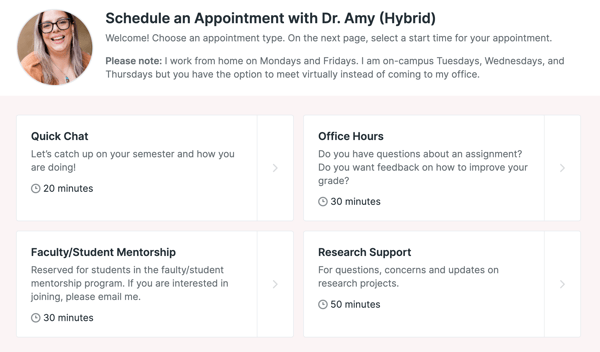
Offering appointment options on one booking page lets you ensure every meeting is the right length, with the right person, and is providing the right support.
It also gives you advance notice of the kinds of meetings you’ll be having throughout the day and how to prepare.
Just by looking at their calendar, they can see they’re meeting with a transfer student at 12, and a veteran student at 2. So, from a preparation standpoint, having that information just at your fingertips has been super helpful for our advisors.- Brittany Wise, Academic Advisor, Missouri State University Case Study |
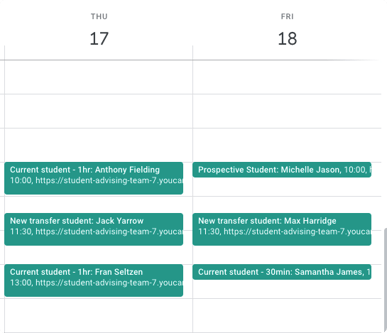
-
Meeting students in person or online?
With a lot of colleges and universities continuing with a hybrid model, you might be in the office one day, and working at home on others.
Non-traditional students may live further away or have commitments that don’t allow them to come to campus every day.
With appointment scheduling software, you can offer a variety of meeting options that work for everyone.
Let students select whether they want to meet in person or by video call.
There are lots of ways to do this if you’re WFH some days and have different schedules than when you’re on campus.
If you’re in the office every day, simply ask the question on your booking form.
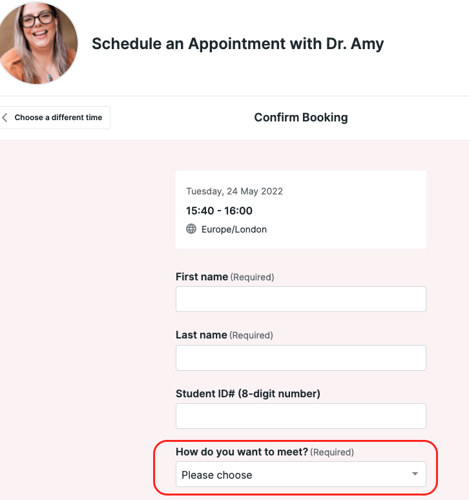
Whatever their choice, the correct information about how and where to meet can be automatically added to your emails and calendar events.
-
Scheduled or walk-in?
It’s the vexing question of our day: Open office hours or scheduled meetings?
More and more faculty and staff members are turning away from open office hours to better manage their time.
But some students like to know they can drop in and you’ll be there when they need you.
To get an answer to this age-old question, we conducted a snap survey of US students and faculty members who use YouCanBook.me.
We asked, “Do you prefer to schedule appointments or just have walk-ins?”
You can read the full results and recommendations on how to manage walk-ins, but TL;DR, both students and faculty expressed a preference for scheduled meetings. Why?
- “I can better prepare by reviewing their history and previous visits.” - Faculty
- “Scheduling is more respectful of everyone’s time so appointments are more efficient and focused.”- Faculty
- “It creates a professional relationship with students to mimic what they can expect in the real world.”- Faculty
- “I’m introverted” - Student
- “I like having to know that I have a secured appointment instead of walking in and waiting in a line.” - Student
- “There’s less waiting around for others in front of you. Get there at your scheduled time and leave after.” - Student
However, both groups acknowledged the flexibility of walk-in office hours, particularly for urgent matters.
So how do you satisfy the majority, who want to have pre-scheduled meetings, but also accommodate those with last-minute concerns?
One option would be to provide ‘emergency’ office hours at the top of your booking page:
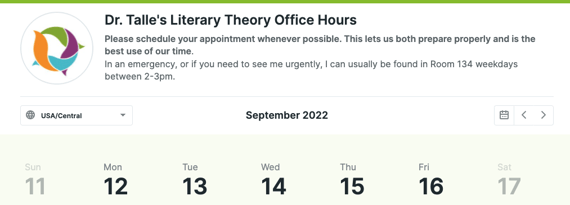
Another is to offer a session that can be booked between specific hours on set days, but let students know they can register to come at any point in that session.
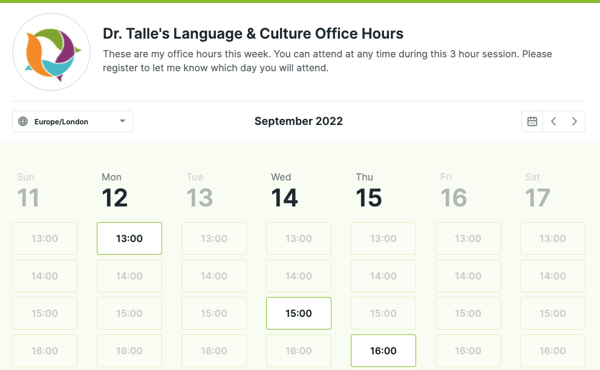
This would use the group sessions functionality outlined in the next section.
Add YouCanBookMe’s custom availability feature, which allows you to easily adjust each week’s office hours, simply by adding them to your work calendar.
Schedule group meetings with ease
Not every session needs to be 1-on-1. Make your appointments more scalable by holding them for groups.
As well as the open office hours option as described above, this option also works really well for information sessions, orientations, and tutoring sessions.
With YouCanBook.me, you can create booking pages for group sessions that allow up to 50 students to attend at the same time.
Provide fixed or flexible meeting durations
For some advising sessions, you might want to let the student decide how long they need with you.
If it’s a quick check-in, or if the time spent depends on the amount of preparation they’ve done, you can set up flexible duration meetings.
When students select a time on your booking page, they will get to choose from a pre-selected group of options for how long they need.
Reject or accept bookings before they’re added to your calendar
For even more control, you can make every new booking a ‘request’.
This gives you the option to either accept or reject the appointment before it’s confirmed.
This is a brilliant way to easily help students who have booked with the wrong advisor, or if they’ve skipped some steps and aren’t quite ready for the meeting.
Be prepared for every student meeting
One of the biggest benefits that educators get from their scheduling software for higher education is the heads-up that booking in advance can give.
- Jeremy Hommowun, Illinois College case study |
Customizable intake forms
A powerful, customizable booking form is the number 1 favorite feature of scheduling software users. It allows you to gather information ahead of a booking so you know what the student wants to cover and who is attending.
With the time saved on scheduling meetings, you can properly prepare for each student.
That means your meetings are more efficient and more productive, with targeted help and immediate solutions.
YouCanBook.me’s powerful customization options can save you even more time, automatically adding the booking form details from each booking wherever you need to access it: in your calendar, emails, even your CRM.
|
💡Pro tip: Tailor your notifications to each booker using shorthand codes. Give each question a unique tag. Then add that tag to emails, SMS, and calendar events. Bookers will receive only the information relevant to their booking. |
Personalize your reminder emails so everyone is prepared
Not only can you provide booking details in reminders for yourself, but you can also add them to student reminders.
Our recent State of Online Scheduling for 2022 shows that 67% of users working in higher education saw no-shows decrease when they started using scheduling software with automated reminders.
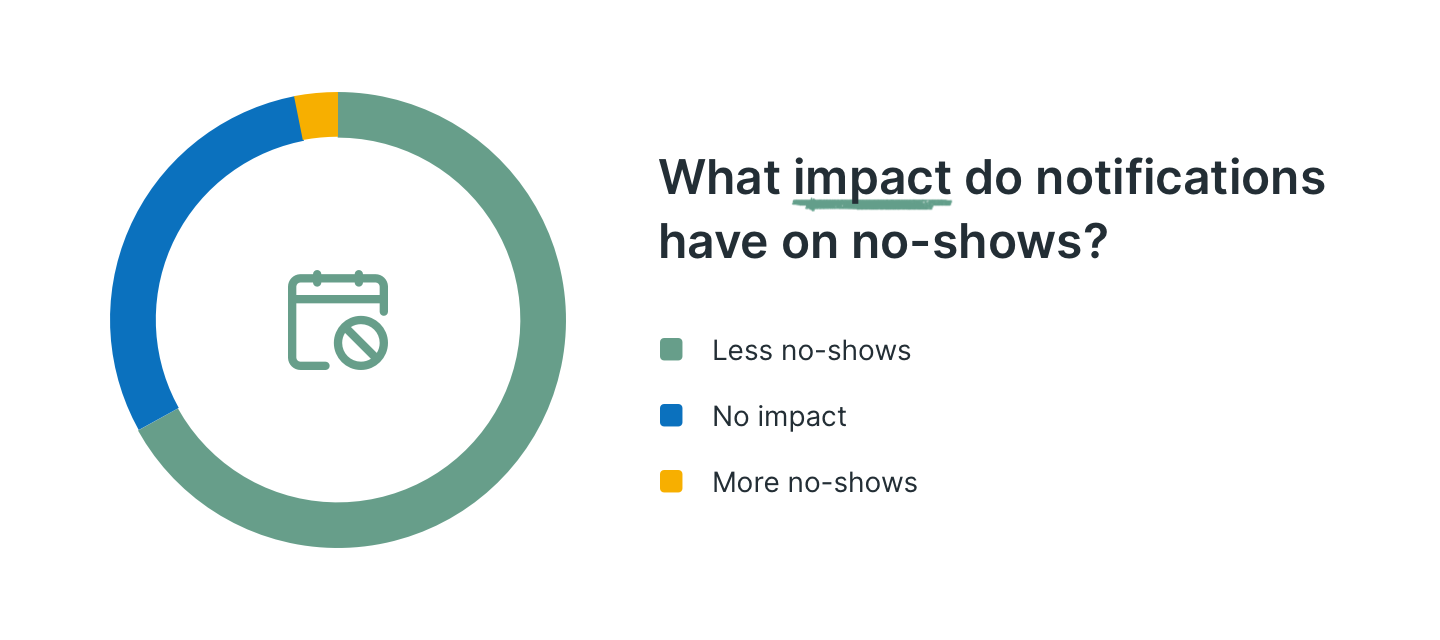
And these reminders can contain much more than the time and date of their booking.
Conditional statements let you provide detailed instructions based on their choices on the booking form.
- Did they ask for an online meeting? Send a Zoom link. Otherwise, give them directions to your office.
- Told you they wanted to switch majors? Send them the paperwork they need to complete.
- Mentioned they were a transfer student? Let them know what transcripts and ID they need to bring to the meeting.
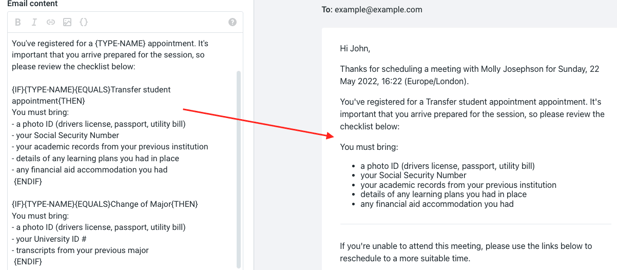
- Sheri Gazitt, Teen coach case study |
The power of redirection
If you have a lot of instructions, or if you’re worried students won’t read a long email, redirect them to a page on your website with the details instead.
As soon as the booking is complete, they’ll be taken to a page that contains all the information they need to know.
Get their attention, no matter where they are
College students are on the go so they don’t always check emails. But we know that most will always have a phone with them. Send important information and reminders as an automatic text.
SMS messages are the perfect solution for reducing no-shows and late arrivals.
Our unlimited messaging (SMS comes at an extra fee) means you can send email or SMS reminders for the same booking, perfectly spaced for maximum impact.
Takeaway: student success depends on successful scheduling
You can’t give good academic advice if there’s no one to hear it.
Educators who use scheduling software report increased student engagement, more streamlined processes, and a better student experience.
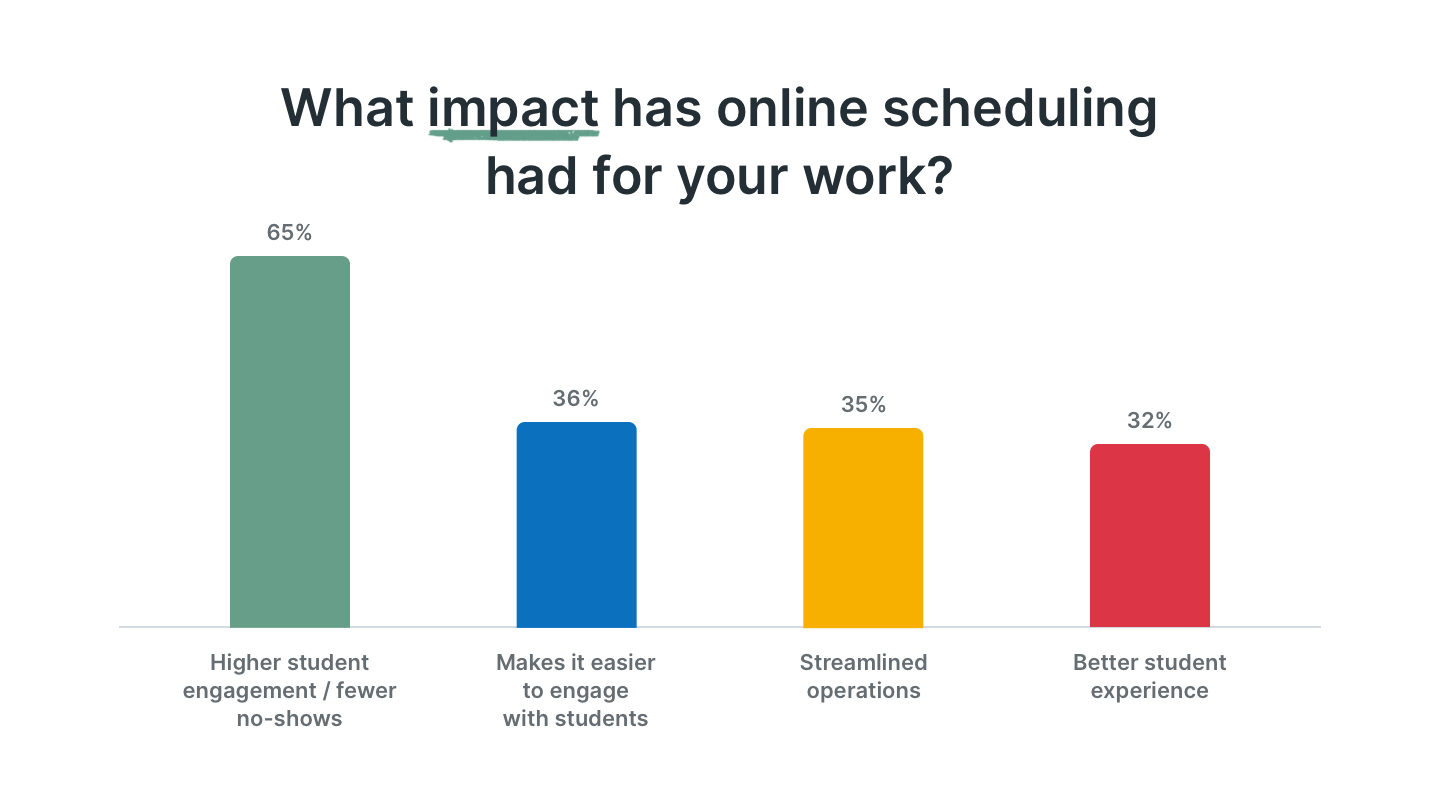
Scheduling software designed for higher education will make a quantifiable contribution to your students’ success because it’s:
- available 24/7, when and where students need it
- accessible
- easy to use
- streamlines your booking process and eliminates low-value tasks
- collects booking data to identify gaps and opportunities to improve student outcomes
- saves you time to focus on having more, and more impactful, student meetings
Want to find out if YouCanBook is the right higher education scheduling software for your team? Start your 14 day Free Trial!
Subscribe to our newsletter
Get productivity tips, news, articles and resources.
Written by
Kate Reynier
Kate is YouCanBookMe's Director of Product. She was YCBM's first employee and feels privileged to have been a part of the journey: from supporting our customers, to helping bring YCBM to life in our blog posts, and now helping to develop a product that our customer love.
Keep reading
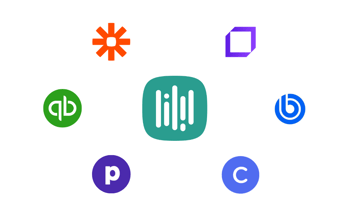
7 Must-Have Coaching Software for Client Success
Streamline your business using these top coaching software, taking the admin tasks off your plate so you can focus on helping your clients become the best version of themselves.
Read bloge1f6.jpg)
Schedule Smarter: 7 Doodle Alternatives to Consider in 2024
On a quest to find the best scheduling tool for your team? Check out the seven best Doodle alternatives, all designed to help you save time and hassle!
Read blog
4 Reasons Why YouCanBookMe Is Better Than Calendly
If you're a small business that truly care about your customers, Calendly isn't the right scheduling tool for you. See why YouCanBookMe is better than Calendly on four major fronts.
Read blog




